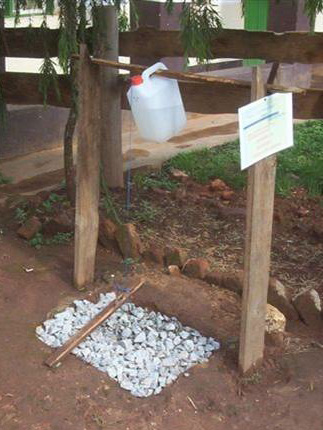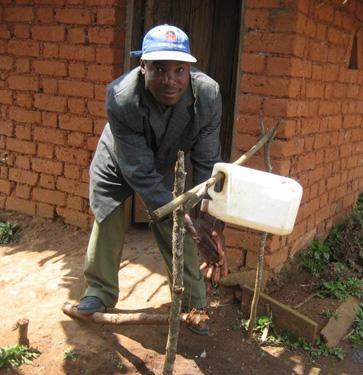Tippy Tap
The Tippy Tap is a simple device for hand washing with running water. A container of 5 liter with a small hole near the cap is filled with water and tipped with a stick and rope tied trough a hole in the cap. As only the soap is touched with the hands, the device is very hygienic. A gravel bed is used to soak away the water and prevent mosquitos.
When the container is empty, the cap is unscrewed and the container is removed from the stick. The container is then filled again at a water pump, and reassembled.
Different models are being used, all under the name "Tippy Tap".
| Advantages | Disadvantages/limitations |
|---|---|
| Very affordable
Easy to construct (can be copied locally) Uses very little water Only soap is touched, therefore handwashing is very hygienic |
If no soak pit is used, mud will form
If installed near a school, someone must be responsible for filling the container |
Applying conditions
- Numbers: Unknown
- Countries used: Tanzania, Zambia, Mozambique and others.
- Useage: Recommended to install in schools and family houses next to the latrine.
Costs
The construction costs of the Tippy Tap are in the range of 0$ if second hand materials are used, 2-4 US$ if new materials are purchased.
Experiences in different countries
Mozambique
In the Nampula region in Mozambique, families made 300 copies of the Tippy Tap after the NGO DAPP installed 20 examples.
Tanzania
In the Southern Highlands region of Tanzania, the NGO Shipo installs examples of the Tippy Tap, after which families make copies. Most of the Tippy Taps are installed near latrines of schools.
Zambia
Some 100 are in use in Zambia, Monze region. More follow-up needed. Sometimes a problem with acquiring good containers.
Movies
Construction manual

|


